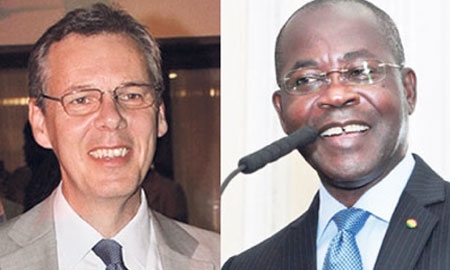Over the past year, Ghana has seen increasingly frequent high level visits from British government officials – including Foreign Secretary William Hague, Minister for Africa Mark Simmonds and International Development Secretary Justine Greening – as well as from the British armed forces. Peter Jones, the British High Commissioner to Ghana, has hailed this as the beginning of a “renaissance in the UK-Ghana relationship.”
“We want to make sure that we are building a holistic economy, rather than one that is dependent on just one sector”
Professor Kwaku Danso-Boafo,
Ghanaian High Commissioner to the UK |
Relations have never been less than warm over the years since independence – as Professor Kwaku Danso-Boafo, Ghanaian High Commissioner to the UK points out when he says, “Since 1957, our relationship has grown from strength to strength.” Nevertheless, for Mr Jones, the upswing in the number of visits means “Ghana is rightfully getting the attention it deserves and I’m hopeful about what will continue.”
Indeed, with a proven knack for democracy and sustained economic expansion – even before the discovery of oil – Ghana is an ideal African partner for UK policy and business. The British High Commissioner underscores the country’s most appealing characteristics, namely rule of law, relative ease in setting up business (Ghana stands at fifth place in sub-Saharan Africa in the World Bank’s Ease of Doing Business rankings), and the fact that it is an English-speaking country.
Those three strong points aside, Mr Jones says that the most important thing Ghana has to offer is its people. “There is a remarkable workforce here if you want to think in economic terms, but I think there is a remarkable population. There are so many very able, creative, energetic, can-do people here that, if I was a company, I’d be very interested,” he emphasises.
Bilateral trade in terms of goods and services is on the rise. Despite having only the eighth largest population in sub-Saharan Africa, Ghana represents the UK’s third largest export market in the region. British exported goods to Ghana grew by 21 per cent between 2011 and 2012, from £426 million to £516 million. This bodes well for the two governments’ trade goals for 2015.
“There is a lot to be optimistic about when it comes to Ghana both politically and economically”
Peter Jones,
British High Commissioner to Ghana |
“We have a specific objective to double the balance of trade in a five-year period, starting in 2010,” says Mr Jones. “The good news is we are on track as things stand.”
Investments are also on the rise. According to Prof Danso-Boafo, UK investments in Ghana stood at £4.9 billion in 2009. “Up to the end of June 2013, it increased to approximately £5.7 billion, with 267 UK-initiated projects in Ghana increasing to 490, reflecting an 80 per cent rise,” he says.
Prof Danso-Boafo goes on to add that the two governments are strengthening and promoting collaborations through a programme called ‘Partnership for Progress’, or PfP. “Through this, we are coordinating a lot of private-sector projects and private-public partnerships (PPPs) between the two countries,” he explains. “Everything is going according to plan. The two countries have everything going for them.”

0 COMMENTS